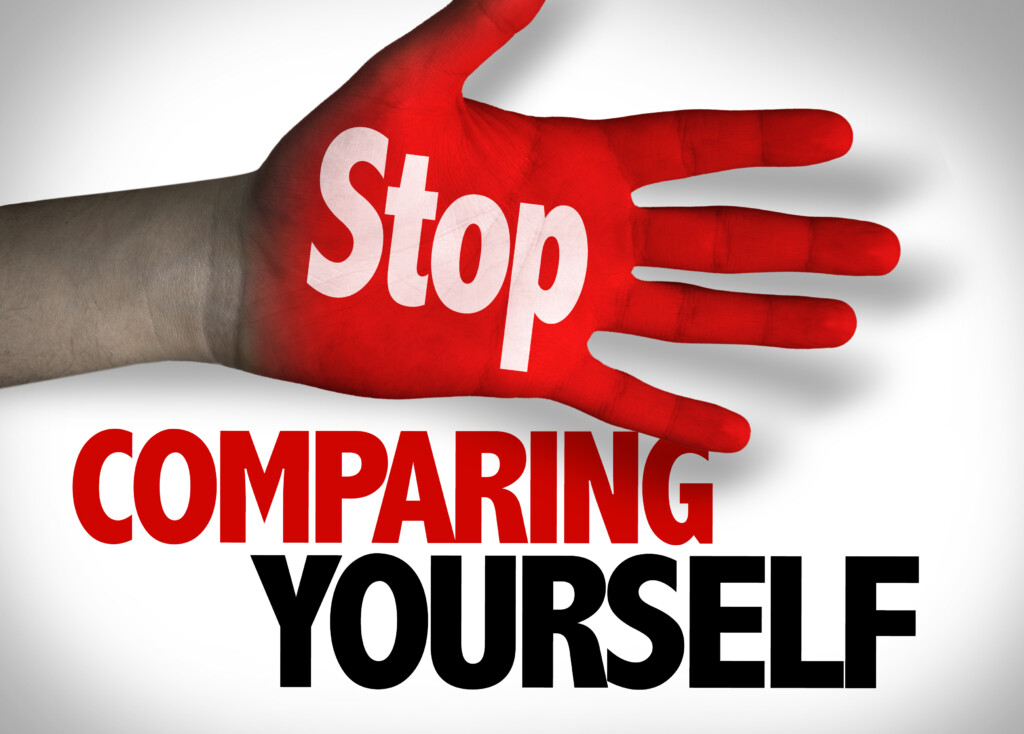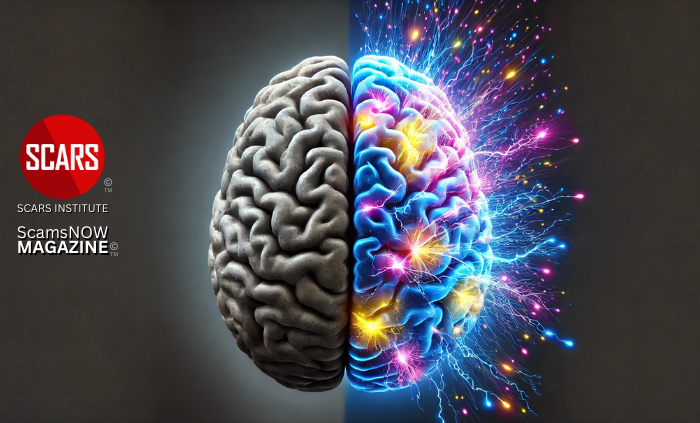Comparisons – the Dangers of Scam Victims Comparing Their Suffering to Others
Comparing One Person’s Pain to another is a Form of Resentment, and it can be very Dangerous Psychologically for Scam Victims
Understanding Scam Victim Recovery Psychology
Authors:
• Vianey Gonzalez B.Sc(Psych) – Licensed Psychologist Specialty in Crime Victim Trauma Therapy, Neuropsychologist, Certified Deception Professional, Psychology Advisory Panel & Director of the Society of Citizens Against Relationship Scams Inc.
• Tim McGuinness, Ph.D. – Anthropologist, Scientist, Director of the Society of Citizens Against Relationship Scams Inc.
About This Article
Scam victims can often compare their suffering or victimization to others for validation, understanding, coping, a sense of community, and advocacy. However, this comparison can lead to resentment and envy, fueled by cognitive biases such as relative deprivation, negative contrast effect, and social comparison bias.
Resentment arises from perceived injustices and activates brain regions associated with emotional processing and social cognition. Envy, on the other hand, stems from feelings of inadequacy and activates neural circuits related to emotion regulation and reward processing.
Overcoming the temptation of comparisons requires cultivating self-compassion, focusing on personal progress, challenging unrealistic comparisons, practicing gratitude, setting realistic goals, seeking support, practicing mindfulness, and focusing on personal values.
By implementing these strategies, scam victims can navigate their recovery journey with resilience, healing, and growth, free from the negative effects of comparison.
Why do Scam Victims Compare their Suffering or Pain to others? Other Victims and those who were not Victimized?
Comparing Victimization
Scam victims or crime victims may compare their experiences to those of other victims for several reasons:
- Validation: Scam victims can seek validation for their experiences by comparing them to others. They might question the severity of their own suffering or wonder if they are overreacting. Seeing similarities with other victims can validate their feelings and experiences, reassuring them that what they went through is real and significant.
- Understanding: Comparing experiences with others can help scam victims understand the nature and impact of the crime better. They may gain insights into common tactics used by perpetrators, recognize patterns of behavior, or learn about available support resources. Understanding that others have gone through similar ordeals can provide a sense of clarity and perspective.
- Coping: Scam victims often compare their experiences as a way to cope with the trauma. By connecting with others who have faced similar challenges, they can find solidarity and support. Sharing stories and strategies for resilience can empower victims and help them navigate the recovery process.
- Sense of Community: Comparing experiences with other victims can foster a sense of community and belonging. Victims may find solace in knowing that they are not alone and that others understand what they are going through. This sense of camaraderie can reduce feelings of isolation and provide a valuable source of emotional support.
- Advocacy: Victims may compare their experiences to raise awareness about the prevalence and impact of crime. By sharing their stories publicly or joining advocacy groups, they can draw attention to important issues, advocate for policy changes, and promote prevention efforts. Seeing the broader context of crime and victimization can inspire victims to become advocates for change.
Comparing experiences with other victims can serve various purposes, ranging from seeking validation and understanding to coping with trauma and advocating for change. It can be a valuable part of the healing journey for individuals who have been affected by crime or scams.
However, it can also come with a dark side: resentment and envy!
Comparing as a Negative Coping Mechanism
Comparing one’s victimization against others can also be a negative coping mechanism, depending on how it’s done and the impact it has on the individual.
Here are some factors to consider:
- Minimization of Suffering: If victims compare their experiences solely to diminish the severity of their own suffering or to invalidate their feelings, it can be detrimental. Minimizing one’s pain in this way may prevent them from seeking help or addressing the emotional impact of the crime. In short, it can freeze recovery.
- Self-Blame: Scam victims may engage in negative comparisons as a form of self-blame, believing that others have endured worse experiences or coped more effectively. This can contribute to feelings of inadequacy, guilt, or shame, hindering the healing process.
- Rumination and Obsession: Frequently comparing one’s victimization to others can lead to rumination and obsession, where the individual becomes fixated on their perceived shortcomings or the injustices they have suffered. This can exacerbate feelings of distress and impede progress toward recovery. It can also contribute to the need to ‘seek justice’ or vigilantism, anger and hate, or more commonly resentment and envy.
- Isolation: Negative comparisons reinforce feelings of isolation and alienation, as scam victims can believe that their experiences are unique or that others won’t understand. This can prevent them from seeking support from peers or professionals who could offer valuable assistance. It also prevents them from learning more about the real approaches that can help them recover and avoid these crimes in the future,
- Stagnation (Getting Stuck): Engaging in negative comparisons can also prevent scam victims from moving forward in their recovery journey. Instead of focusing on their own healing and growth, they become stuck in a cycle of self-doubt and comparisons, unable to progress toward a more positive future. As previously said, this can lead to resentment and envy.
While comparing victimization experiences with others can sometimes be unhelpful or harmful, it’s essential to recognize that seeking support and understanding from peers is beneficial. When done in a constructive and empathetic manner, sharing experiences with others who have been through similar ordeals can provide validation, solidarity, and a sense of community with others who have or are suffering from the trauma created by these crimes. Victims must engage in healthy coping mechanisms, seek professional support, and work to avoid negative comparisons because of the potential impact on their well-being.
Comparison Phenomenon
The phenomenon where crime victims compare their suffering against others and resent that others did not suffer as much, can be related to several negative psychological concepts:
- Relative Deprivation: This concept refers to the feeling of discontent that arises when individuals perceive that they are worse off than others with whom they compare themselves. In the context of scam victims, they may experience relative deprivation if they believe that others did not suffer as much as they did from similar experiences.
- Negative Contrast Effect: A cognitive bias that occurs when individuals perceive their own situation as less favorable than that of others, leading to negative emotions such as envy or resentment. Crime victims may experience the negative contrast effect if they focus on the perceived lesser suffering of other victims, leading to feelings of resentment or unfairness.
- Social Comparison Bias: A cognitive bias that refers to the tendency of individuals to evaluate themselves and their experiences based on comparisons with others. In the case of crime victims, this bias may lead them to selectively focus on comparisons that reinforce negative perceptions of their own suffering relative to others.
- Resentment: Resentment is a complex emotional response characterized by feelings of bitterness or indignation toward others perceived as causing one’s own suffering or experiencing less suffering. Crime victims may experience resentment toward other victims whom they perceive as having suffered less, particularly if they believe their own suffering is being minimized or invalidated.
While there may not be a specific psychological term that encapsulates all aspects of this phenomenon, it can be understood through the lens of these concepts and the broader framework of social comparison and emotional response to perceived injustices.
Relative Deprivation
Relative deprivation is a psychological concept that arises when individuals perceive themselves as unfairly disadvantaged compared to others.
It occurs when people feel that they lack resources, opportunities, or status relative to those around them, leading to feelings of resentment, frustration, and discontentment. In the context of scam victims, relative deprivation can manifest when they compare their own suffering or victimization to that of others.
Scam victims experience relative deprivation in various ways. Firstly, they might compare their financial losses or emotional trauma to those of other victims or non-victims, feeling that their own experience is more severe or unjust. This can exacerbate feelings of anger, bitterness, and a sense of being unfairly treated by fate or circumstance. This is somewhat natural but must be controlled or it can easily get out of control.
Moreover, in the aftermath of a scam, victims may also compare their recovery progress to that of others. Seeing fellow victims seemingly moving on with their lives more quickly or coping better can intensify feelings of inadequacy, self-blame, and frustration. This comparison may lead to a distorted perception of their own recovery journey, hindering progress and exacerbating psychological distress. It can be useful to compare one’s own progress against an ideal model, but never against other victims specifically. This is particularly important in cases where scam victims drifted away from recovery or stalled their progress through resistance and avoidance mechanisms.
Sadly, in the age of social media, where individuals often create idealized (fake) versions of their lives, scam victims may be exposed to unrealistic portrayals of resilience and success. Seeing others seemingly unaffected by similar experiences can fuel feelings of isolation and alienation, amplifying the sense of relative deprivation.
In essence, relative deprivation among scam victims underscores the complexity of their psychological experience. By comparing their suffering or victimization to that of others, they can inadvertently magnify their own sense of injustice and hardship, hindering their ability to heal and move forward. Recognizing and addressing these feelings within an honest, supportive, and understanding environment is mandatory in facilitating the recovery process and fostering resilience among scam victims.
Negative Contrast Effect
The negative contrast effect is a psychological phenomenon where individuals perceive a current situation as worse than it actually is because it is compared to more favorable or idealized situations, such as the lives of others.
This cognitive bias leads people to devalue their current circumstances relative to a better alternative, resulting in dissatisfaction and negative emotions, such as resentment or envy. In the context of scam victims comparing their suffering or victimization to others, the negative contrast effect can play a significant role in stopping recovery and healing and leaving victims stuck.
Scam victims can experience the negative contrast effect when they compare their own experience to that of others whom they perceive as having suffered less or recovered more quickly.
For example, suppose a victim sees someone who appears to have bounced back swiftly from a similar scam. In that case, they may feel even more distraught about their own situation, perceiving their recovery as slower or more challenging than it actually is. This can lead to feelings of inadequacy, frustration, and self-blame, exacerbating the psychological toll of the scam. It can also lead to resentment of the others.
Also, because of social media where individuals often showcase only the positive aspects of their lives, scam victims may be particularly susceptible to the negative contrast effect. Seeing curated depictions of others’ seemingly perfect lives can magnify their own feelings of distress and disillusionment, further intensifying the contrast between their own suffering and others’ apparent well-being.
The negative contrast effect is a cognitive bias, as it involves a systematic deviation from rational judgment due to the comparison of different situations or stimuli. In the case of scam victims, this bias distorts their perception of their own experience relative to that of others, contributing to heightened distress and hindering the recovery process.
Recognizing the negative contrast effect and its impact on scam victims is critical for obtaining effective support, recovery, and healing. By addressing the tendency to compare their suffering to that of others and helping them cultivate a more realistic and compassionate view of their own recovery journey, individuals can mitigate the negative effects of this bias and foster resilience in themselves.
Social Comparison Bias
Social comparison bias refers to the tendency for individuals to evaluate themselves and their circumstances by comparing them to those of others. This comparison can lead to either upward or downward (superiority or inferiority) social comparisons, where individuals assess themselves as either better off or worse off than others in various aspects of life. In the context of scam victims comparing their suffering or victimization to others, social comparison bias can play a significant role in stopping their recovery (getting stuck in the comparisons), or other harmful effects.
Scam victims can engage in social comparison as they seek to make sense of their experience and cope with the emotional aftermath of the scam. However, these comparisons can bring many challenges and may increase feelings of distress and inadequacy.
For instance, victims may engage in upward social comparisons, perceiving others as having suffered less or recovered more successfully from similar scams. This can lead to feelings of resentment, envy, self-doubt, and diminished self-worth as victims perceive themselves as falling short in comparison.
Conversely, victims may also engage in downward social comparisons, where they perceive themselves as having suffered more or experienced greater victimization than others. While this may temporarily alleviate feelings of inadequacy, it can also reinforce a sense of victimhood and perpetuate negative emotions such as resentment and bitterness towards others who appear to have been less affected.
Social comparison bias can be made worse by factors such as social media, other victims, family and friends, and society as a whole which tends to tell victims how they should react and behave, leading to distorted perceptions of reality. Scam victims may be particularly susceptible to these distortions, further intensifying their feelings of distress and isolation.
It’s important to recognize that social comparison bias is a natural cognitive process that occurs across various contexts and affects individuals differently. For scam victims, becoming aware of this bias and its impact on their emotions and perceptions can be an important step in rebuilding resilience and facilitating recovery. Scam victims need to focus on their own unique journey, validate their emotions, and seek support from others who can provide honest assessments, empathy, and understanding. Individuals can mitigate the negative effects of social comparison bias and promote healing and growth by staying focused on their own recovery journey and helping to support others.
Resentment and Envy
Resentment and envy are complex emotions that can profoundly impact individuals, especially in the aftermath of traumatic experiences such as falling victim to a scam. These emotions often arise when individuals perceive themselves as disadvantaged or unfairly treated in comparisons to others, leading to a range of negative psychological effects.
- Resentment typically stems from a sense of injustice or perceived wrongdoing, where individuals feel anger, bitterness, and indignation towards those they believe have wronged them. In the context of scam victims, resentment can manifest when they compare their own suffering or victimization to that of others. For example, a scam victim may feel resentful towards someone who appears to have recovered more quickly or received more support following a similar scam. This sense of unfairness and frustration can be exacerbated by feelings of powerlessness and betrayal resulting from the scam experience.
- Envy involves a desire for the possessions, qualities, or circumstances of others, often accompanied by feelings of inadequacy or inferiority. Scam victims may experience envy when they perceive others as having fared better or achieved greater financial stability following similar scams. This can evoke feelings of self-doubt, inadequacy, and resentment towards those who appear to have been less affected by the scam.
Resentment
Resentment is a complex emotional response that can have profound psychological effects on anyone, but especially on scam victims.
It typically arises in response to perceived injustices, betrayals, or grievances, and it involves a combination of cognitive, emotional, and behavioral components.
Psychologically, resentment often begins with a sense of unfairness or wrongdoing perceived by the individual.
This perception can trigger feelings of anger, bitterness, and indignation, which may be directed toward the person or situation perceived as the source of the injustice, or at those that try to help the scam victims overcome those feelings.
The individual may ruminate on the perceived offense, replaying the events in their mind and dwelling on the feelings of hurt and betrayal. This rumination can intensify the emotional response and reinforce negative beliefs about the situation and the individuals involved. Learning about the realities of the situation, specifically in the case of scams, can be very helpful in reducing or overcoming feelings of resentment.
Cognitive Biases
Resentment also involves cognitive biases that can distort perceptions of reality and contribute to the maintenance of negative emotions.
- Scam victims experiencing resentment may engage in Selective Perception/Attention, focusing only on information that confirms their negative beliefs and disregarding evidence to the contrary. This is the tendency to see what we want to see and ignore what we do not want to see. For example, we might be more likely to notice news stories that confirm our existing beliefs, and less likely to notice news stories that contradict our beliefs.
- They may also engage in Attribution Bias, attributing negative motives or intentions to others while absolving themselves of responsibility. This is the tendency to attribute our own successes to our own abilities and our failures to external factors. For example, we might think that we won a game of tennis because we are a good player, but we might think that we lost a game of tennis because the other player was lucky.
- Another contributor is Just-World Hypothesis – a psychological theory that suggests that people have a strong need to believe that the world is a fair and just place. This belief can lead people (or even victims) to blame victims of misfortune for their own suffering and to hold positive views of themselves and others.
Brain Mechanisms
In terms of brain mechanisms, resentment involves the activation of various neural circuits associated with emotion regulation, social cognition, and reward processing (Striatum.)
Functional MRI studies have shown that experiencing resentment activates brain regions involved in emotional processing, such as the amygdala and insula, responsible for generating anger and distress. Additionally, regions involved in social cognition, such as the prefrontal cortex and anterior cingulate cortex, are recruited during the processing of perceived injustices, as individuals evaluate the intentions and motivations of others.
Over time, chronic resentment can have detrimental effects on mental health and well-being. Prolonged exposure to negative emotions such as anger and bitterness has been linked to an increased risk of depression, anxiety, and interpersonal conflict. Moreover, the physiological stress response associated with resentment, including elevated levels of cortisol and inflammation, can contribute to physical health problems such as cardiovascular disease and immune dysfunction.
Managing Resentment
Managing resentment requires a combination of cognitive-behavioral strategies and emotion regulation techniques. Cognitive restructuring, for example, involves challenging negative beliefs and assumptions about the situation and adopting more balanced and adaptive perspectives. Emotion regulation techniques such as mindfulness meditation and relaxation exercises can help individuals cultivate greater emotional awareness and reduce reactivity to triggering events. Additionally, seeking social support from trusted friends, family members, support services (such as provided by SCARS,) or mental health professionals can provide validation, perspective, and coping strategies for dealing with resentment in healthy ways.
Envy
Envy is another complex emotion that arises when individuals perceive that others possess something desirable (such as wealth, success, happiness, or are even recovering faster or more completely) that they themselves lack.
In the context of scam victims, envy may manifest in various ways, particularly when comparing their own circumstances to those of others who appear to be more fortunate or less victimized.
Psychology of Envy
Psychologically, envy involves a combination of cognitive, emotional, and motivational components. When scam victims perceive others as having avoided victimization or recovered more successfully, they may experience feelings of resentment, bitterness, and inadequacy. These emotions can lead to rumination and negative self-comparisons, where victims focus on their own perceived shortcomings or failures in contrast to the perceived successes of others.
Cognitive Biases
Envy can also trigger a range of cognitive biases that distort perceptions and increase negative emotions.
Scam victims may engage in upward Social Comparison, where they compare themselves unfavorably to individuals they perceive as more successful or fortunate. This can lead to feelings of inferiority and self-doubt, as victims internalize the belief that they are somehow lacking compared to others.
Brain Mechanisms
In terms of brain mechanisms, envy involves the activation of neural circuits associated with emotion regulation, social cognition, and reward processing. Functional MRI studies have shown that experiencing envy activates brain regions involved in emotional processing, such as the amygdala and insula, which are responsible for generating feelings of distress and discomfort. Additionally, regions involved in social comparison, such as the medial prefrontal cortex and anterior cingulate cortex, are recruited during the processing of perceived inequalities, as individuals evaluate their own standing relative to others.
Managing Envy
The experience of envy can have significant implications for mental health and well-being, particularly in vulnerable populations such as scam victims.
Chronic envy has been associated with an increased risk of depression, anxiety, and low self-esteem, as individuals struggle to cope with feelings of inadequacy and unfairness. Moreover, envy can fuel maladaptive coping behaviors such as aggression, social withdrawal, and substance abuse, further worsening psychological distress.
Managing envy requires a multifaceted approach that addresses both cognitive distortions and emotional regulation strategies. Cognitive-behavioral techniques such as Cognitive Restructuring can help individuals challenge negative beliefs and replace them with more balanced and adaptive perspectives. Emotion regulation techniques such as mindfulness meditation and relaxation exercises can help individuals cultivate greater emotional awareness and resilience in the face of envy-triggering situations.
Additionally, fostering gratitude and appreciation for one’s own accomplishments and blessings can help counteract feelings of envy and promote a more positive outlook on life. Seeking social support from trusted friends, family members, or mental health professionals can also provide validation, perspective, and coping strategies for dealing with envy in healthy ways. By addressing the underlying cognitive and emotional factors driving envy, scam victims can work towards greater psychological well-being and resilience in the aftermath of victimization.
Overcoming the Temptation of Comparisons
Overcoming the temptation of comparisons for scam victims is essential for sustaining recovery and healing.
Here are some effective strategies to help scam victims overcome this challenge:
-
- Cultivate Self-Compassion: Start by treating yourself with kindness and understanding. Acknowledge that you’re not alone in your struggles and that it’s okay to feel a range of emotions after what you’ve been through. Recognize that self-compassion means acknowledging your suffering without negative judgment and offering yourself the same care and support that you would offer to a friend in a similar situation.
- Focus on Personal Progress: Shift your focus to your own progress and growth instead of comparing yourself to others. Remember that recovery is a personal journey, and celebrate every small victory and milestone along the way. Recognize the resilience and strength it takes to overcome adversity and appreciate your progress, no matter how small.
- Challenge Unrealistic Comparisons: Challenge any unrealistic comparisons by questioning the validity of your thoughts and beliefs. Ask yourself if your comparisons are fair and accurate or if they’re based on skewed perceptions or cognitive biases. Work on recognizing and challenging cognitive distortions to develop more balanced and realistic perspectives.
- Practice Gratitude: Cultivate a sense of gratitude by focusing on the positive aspects of your life, even amidst challenges. Keep a gratitude journal where you can regularly write down things you’re thankful for, no matter how small. Practicing gratitude will help you shift your focus away from comparisons and towards appreciation for what you have.
- Set Realistic Goals: Set realistic and achievable goals for your recovery journey, but understand that uncertainty is a constant in recovery. Focus on concrete actions you can take to move forward, rather than comparing yourself to an idealized standard of recovery. Break larger goals into smaller, manageable steps to maintain motivation and momentum. Stay focused on the moment.
- Seek Support: Seek support from trusted friends, family members, support services providers (such as SCARS,) or mental health professionals who can provide validation, empathy, and encouragement. Consider joining support groups or online communities for scam victims to find solidarity and understanding, reducing feelings of isolation and shame. Just be cautious of the tendency to compare yourself to other group members.
- Practice Mindfulness: Practice mindfulness techniques to stay present-focused and nonjudgmental. Engage in mindfulness meditation, deep breathing exercises, and body scans to cultivate greater self-awareness and emotional regulation, reducing the urge to compare yourself to others.
- Focus on Personal Values: Identify your core values and priorities in life and align your actions with these values. Remind yourself that recovery is about living in accordance with your own values and aspirations, rather than measuring yourself against external standards or expectations. But be careful about pride, as it can easily creep into your values!
By implementing these strategies, you can gradually overcome the temptation of comparisons and embark on a path of recovery and healing grounded in honesty, self-compassion, resilience, and personal growth.

Statement About Victim Blaming
Some of our articles discuss various aspects of victims. This is both about better understanding victims (the science of victimology) and their behaviors and psychology. This helps us to educate victims/survivors about why these crimes happened and to not blame themselves, better develop recovery programs, and to help victims avoid scams in the future. At times this may sound like blaming the victim, but it does not blame scam victims, we are simply explaining the hows and whys of the experience victims have.
These articles, about the Psychology of Scams or Victim Psychology – meaning that all humans have psychological or cognitive characteristics in common that can either be exploited or work against us – help us all to understand the unique challenges victims face before, during, and after scams, fraud, or cybercrimes. These sometimes talk about some of the vulnerabilities the scammers exploit. Victims rarely have control of them or are even aware of them, until something like a scam happens and then they can learn how their mind works and how to overcome these mechanisms.
Articles like these help victims and others understand these processes and how to help prevent them from being exploited again or to help them recover more easily by understanding their post-scam behaviors. Learn more about the Psychology of Scams at www.ScamPsychology.org
Please Leave Us Your Comment
Also, tell us of any topics we might have missed.
Leave a Reply
Thank you for your comment. You may receive an email to follow up. We never share your data with marketers.
Recent Reader Comments
on Scam Victims & Mental Health Blaming: “Being careful and selective in where to seek support for my recovery journey is very important. Negative reinforcements as a…” Oct 20, 21:35
on Substance Abuse Susceptibility And Scam Victims – 2024: “Unresolved trauma, past and present, manifested as pain in our body. Numbing the pain through substance abuse sabotaged the opportunity…” Oct 20, 03:36
on Relearning Critical Thinking And To Think Skeptically – For Scam Victims After A Relationship Scam – 2024: “From articles like this one, I have learned to step back and take my time responding to difficult situations that…” Oct 17, 10:43
on Entitlement Mentality And How Scam Victims Often Lose Their Path To Recovery – 2024: “In the aftermath of my scam, I struggled to wrap my head around the financial loss as well as the…” Oct 17, 05:35
on Labyrinth Walking and Spiral Walking Meditation for Scam Victims – 2024: “I also find similar benefits of Labyrinth walking with my daily run. I usually reflect on my recovery progress with…” Oct 15, 11:26
on Faith And Why It Matters In Scam Victim Recovery – 2024: “In religious belief, do you believe that faith is also used as tools/technique to fool/scam, and sexually exploit people?” Oct 15, 10:52
on Anxiety And Mindfulness – A Tool For Scam Victims – 2024 – [VIDEOS]: “Thanks to articles like this one I have found mindfulness techniques like focusing on my breath really helpful.” Oct 15, 07:09
on Helping Scam Victims Understand The Social Isolation Risks After A Relationship Scam – 2024: “I remembered reading this article once before when I first joined SCARS Institute. I made sure to participate, interact and…” Oct 14, 15:00
on Do Scam Victims Become Cynics After Their Scam Experience? 2023: “I think I am a mix of cynics and realists depending on the subject matter. Moreover, I am becoming more…” Oct 14, 14:25
on Toxic Self-Narratives That Feeds Depression in Scam Victims 2023: “For me the healing journey happens on the inside. Getting to know what hurts inside and what to do to…” Oct 12, 13:17
Did you find this article useful?
If you did, please help the SCARS Institute to continue helping Scam Victims to become Survivors.
Your gift helps us continue our work and help more scam victims to find the path to recovery!
You can give at donate.AgainstScams.org
Important Information for New Scam Victims
- Please visit www.ScamVictimsSupport.org – a SCARS Website for New Scam Victims & Sextortion Victims
- SCARS Institute now offers a free recovery program at www.SCARSeducation.org
- Please visit www.ScamPsychology.org – to more fully understand the psychological concepts involved in scams and scam victim recovery
If you are looking for local trauma counselors please visit counseling.AgainstScams.org or join SCARS for our counseling/therapy benefit: membership.AgainstScams.org
If you need to speak with someone now, you can dial 988 or find phone numbers for crisis hotlines all around the world here: www.opencounseling.com/suicide-hotlines
A Question of Trust
At the SCARS Institute, we invite you to do your own research on the topics we speak about and publish, Our team investigates the subject being discussed, especially when it comes to understanding the scam victims-survivors experience. You can do Google searches but in many cases, you will have to wade through scientific papers and studies. However, remember that biases and perspectives matter and influence the outcome. Regardless, we encourage you to explore these topics as thoroughly as you can for your own awareness.
More Related Victim Psychology Information:
- The Uniqueness Of Scam Victims Or Fraud Victims – 2024 (scamsnow.com)
- Scam Victims And The Crossing Of The River Styx – An Interpretation Of The Recovery Process – 2023 (scamsnow.com)
- Scam Victim Stress – The Psychological, Cerebral, and Physiological Effects – 2024 (scamsnow.com)
- Rebuilding Trust: The Scam Victim’s Journey from Victimhood to Empowerment – 2024 (scamsnow.com)
- Helping Scam Victims Understand Cognitive Dissonance – 2024 (scamsnow.com)
- Cognitive Biases Catalog 2024 (romancescamsnow.com)
SCARS Resources:
- Getting Started: ScamVictimsSupport.org
- FREE enrollment in the SCARS Institute training programs for scam victims SCARSeducation.org
- For New Victims of Relationship Scams newvictim.AgainstScams.org
- Subscribe to SCARS Newsletter newsletter.againstscams.org
- Sign up for SCARS professional support & recovery groups, visit support.AgainstScams.org
- Find competent trauma counselors or therapists, visit counseling.AgainstScams.org
- Become a SCARS Member and get free counseling benefits, visit membership.AgainstScams.org
- Report each and every crime, learn how to at reporting.AgainstScams.org
- Learn more about Scams & Scammers at RomanceScamsNOW.com and ScamsNOW.com
- Learn more about the Psychology of Scams and Scam Victims: ScamPsychology.org
- Self-Help Books for Scam Victims are at shop.AgainstScams.org
- Worldwide Crisis Hotlines: International Suicide Hotlines – OpenCounseling : OpenCounseling
- Campaign To End Scam Victim Blaming – 2024 (scamsnow.com)
Psychology Disclaimer:
All articles about psychology and the human brain on this website are for information & education only
The information provided in this and other SCARS articles are intended for educational and self-help purposes only and should not be construed as a substitute for professional therapy or counseling.
Note about Mindfulness: Mindfulness practices have the potential to create psychological distress for some individuals. Please consult a mental health professional or experienced meditation instructor for guidance should you encounter difficulties.
While any self-help techniques outlined herein may be beneficial for scam victims seeking to recover from their experience and move towards recovery, it is important to consult with a qualified mental health professional before initiating any course of action. Each individual’s experience and needs are unique, and what works for one person may not be suitable for another.
Additionally, any approach may not be appropriate for individuals with certain pre-existing mental health conditions or trauma histories. It is advisable to seek guidance from a licensed therapist or counselor who can provide personalized support, guidance, and treatment tailored to your specific needs.
If you are experiencing significant distress or emotional difficulties related to a scam or other traumatic event, please consult your doctor or mental health provider for appropriate care and support.
Also read our SCARS Institute Statement about Professional Care for Scam Victims – click here
If you are in crisis, feeling desperate, or in despair please call 988 or your local crisis hotline.
-/ 30 /-
What do you think about this?
Please share your thoughts in a comment below!
More ScamsNOW.com Articles
SCARS LINKS: AgainstScams.org RomanceScamsNOW.com ContraEstafas.org ScammerPhotos.com Anyscam.com ScamsNOW.com
reporting.AgainstScams.org support.AgainstScams.org membership.AgainstScams.org donate.AgainstScams.org shop.AgainstScams.org
youtube.AgainstScams.org linkedin.AgainstScams.org facebook.AgainstScams.org













Everyone has their own story and challenges. I like how this article ends with the positive action items listed in the last section “ Overcoming the Temptation of Comparisons”.
Thank you for this.
We are our own worst critics, specially when comparing ourselves and our circumstances with others.
Positivity is so important because that leads to being kind to yourself. I learnt that I am more realistic if I have a positive attitude
I like how this article discusses both the negative and positive aspects of comparing yourself with others.
Very nice article to help us be aware of falling into envy and comparison. I am personally practicing mindfulness and gratitude and can say is a game changer.